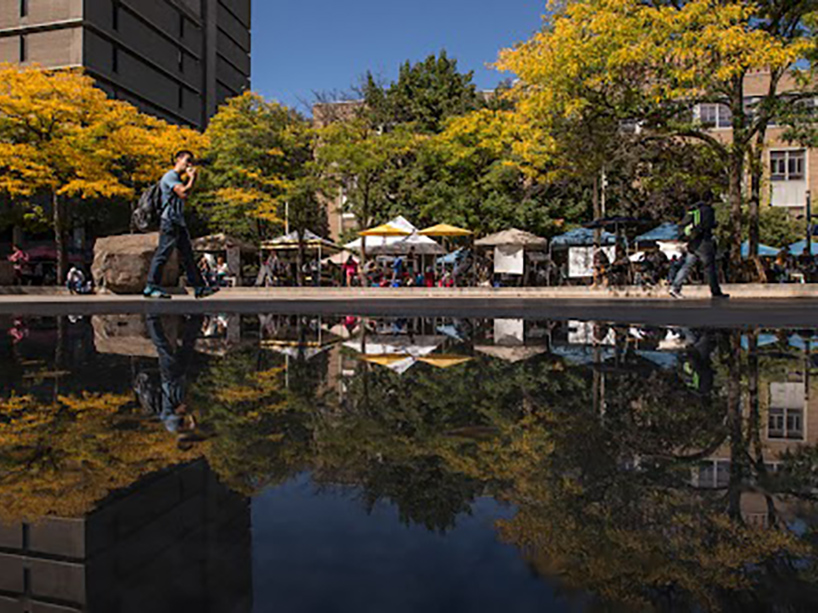TMU recognized for global leadership in environmental sustainability and EDI in Times Higher Education Impact Rankings

TMU first participated in the Times Higher Education Impact Rankings in 2023, as part of the university’s commitment to advancing the UN’s Sustainable Development Goals (SDGs).
TMU was ranked among the top 15 per cent of 2,154 universities evaluated worldwide, demonstrating its global impact on sustainable development and efforts to drive positive social, economic and environmental change. This year, despite an increase of nearly 450 newly participating universities, TMU has maintained its position in the overall rankings while also advancing in specific areas.
“This is a strong performance we can be proud of, and one that demonstrates the incredible work taking place across the university,” says Roberta Iannacito-Provenzano, provost and vice-president, academic. “We have a responsibility to join the universal call to action to end poverty and inequality, protect the planet and ensure that all people enjoy health, justice and prosperity.”
TMU has moved into the top 100 in the world on:
SDG 6: Clean water and sanitation
Ranked 88th, TMU’s achievement in this area is largely attributed to the contributions of Urban Water TMU, a multidisciplinary consortium of researchers solving complex urban water challenges through transdisciplinary research, strong external networks and collaborative action.
Urban Water TMU has a research facility in the Centre for Urban Innovation. There, researchers and students are researching a variety of freshwater issues with state of the art equipment in a water analytics lab, an experimental lab, and dedicated office spaces for research, data analysis and writing activities.
Urban Water TMU is a leader in transdisciplinary research in urban water management and governance, urban natural systems and green technologies, and freshwater science and governance, working with government, private industry, and non-profit organizations to translate research into practical action.
TMU also aims to make an impact in Canadian freshwater policy through its Bruce Fellowships in Environment and Canadian Freshwater Policy. The fellowships play a crucial role in fostering emerging scholars, who will become Canada’s next generation of water policy leaders and practitioners looking to make an impact in positions at the federal, provincial and municipal levels and in non-government organizations working on environment and freshwater policy.
SDG 10: Reduced inequalities
TMU tied for 78th position for its work to reduce inequalities and remove barriers to access while addressing systemic issues. Through the Office of the Vice-President, Equity and Community Inclusion (OVPECI), significant progress has been made to dismantle systemic barriers to support and empower all members of the TMU community.
The university scored particularly highly for the proportion of and supports for students and employees with disabilities. The Employees with Disabilities Community Network brings together employees with disabilities, providing a forum to support one another through shared understanding and experiences. TMU’s Academic Accommodation Support also provides resources, education, training and services related to academic accommodation plans to ensure students with disabilities have an equal opportunity to access and participate in higher education.
The Office of Social Innovation’s Sanctuary Scholars Program supports the fundamental right to education by addressing access barriers for students with precarious immigration status. Developed in partnership with the OVPECI and Registrar’s Office, the program enables sanctuary scholars to overcome significant barriers and contribute their gifts and skills positively to their communities..
In addition, Gdoo-maawnjidimi Mompii Indigenous Student Services in the Indigenous Initiatives unit of the OVPECI offers culturally supportive programs and support that balances academic excellence with traditional teachings and culture, addressing barriers to post-secondary education for Indigenous students.
Further, the Presidential Implementation Committee to Confront Anti-Black Racism has made significant investments in events and initiatives that centre Black students and promote Black flourishing on campus. TMU has made investments in the exemplary work of Black scholars and has created pathways for prospective Black faculty through the Black Scholarship Institute and Postdoctoral Fellowships for Black Scholars.
SDG 13: Climate action
TMU tied in 100th place for restorative climate action, demonstrating the university’s continued commitment to championing sustainability. Through the Sustainability Office, TMU is doing its part to tackle climate change, reduce campus greenhouse gas emissions, and educate and raise awareness about climate change to empower our campus community to take tangible steps towards a sustainable future.
Some of the ways the office is helping to drive sustainability forward at TMU include its annual Climate Week campaign which offers a series of engaging events and activities to promote sustainable practices across campus, and the implementation of sustainable purchasing guidelines designed to reduce the environmental impact of purchasing decisions and ensure purchases are aligned with university-wide sustainability goals for responsible resource management and social sustainability.
Additionally, the university launched its first Sustainability Action Plan earlier this year, developed in alignment with the SDGs and the institution’s sustainable development priorities. Three long-term goals were identified as part of the five-year plan:
- Goal #1: Achieve a platinum STARS sustainability rating by 2035 (TMU’s current STARS ranking is silver)
- Goal #2: A zero-waste campus by 2035
- Goal #3: Net-zero Scope 1 & 2 emissions by 2045
The contributions of students, faculty and staff helped to create this plan of action that was designed for the TMU community by the TMU community.
University-wide engagement is crucial to ensuring TMU’s standing in the Times Higher Education rankings reflects the impact of our stewardship, outreach, teaching and research. To learn more about TMU’s journey in advancing the UN SDGs, or to share an initiative your area is leading, visit the website or contact the University Planning Office at UPO@torontomu.ca.
